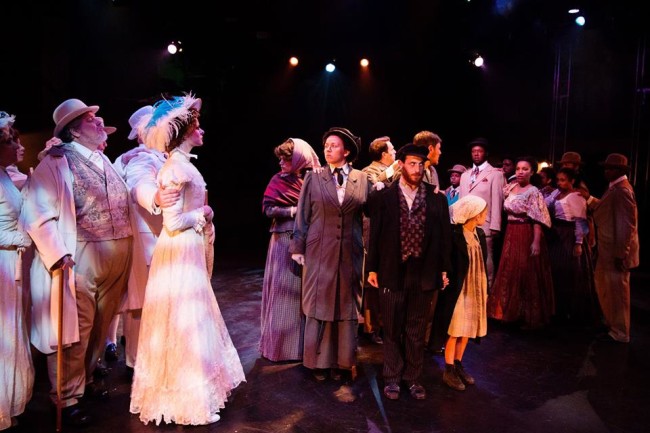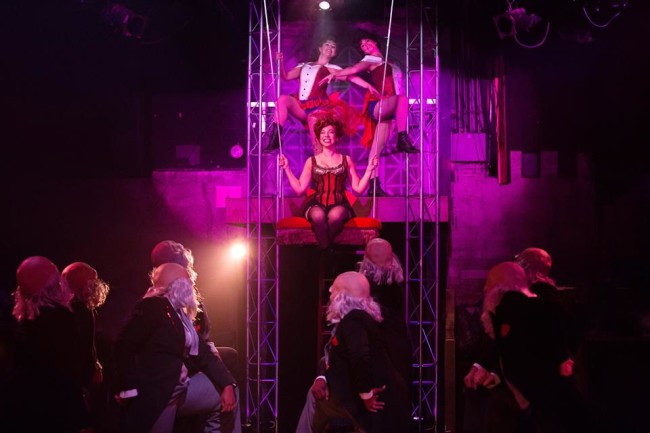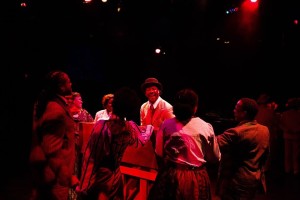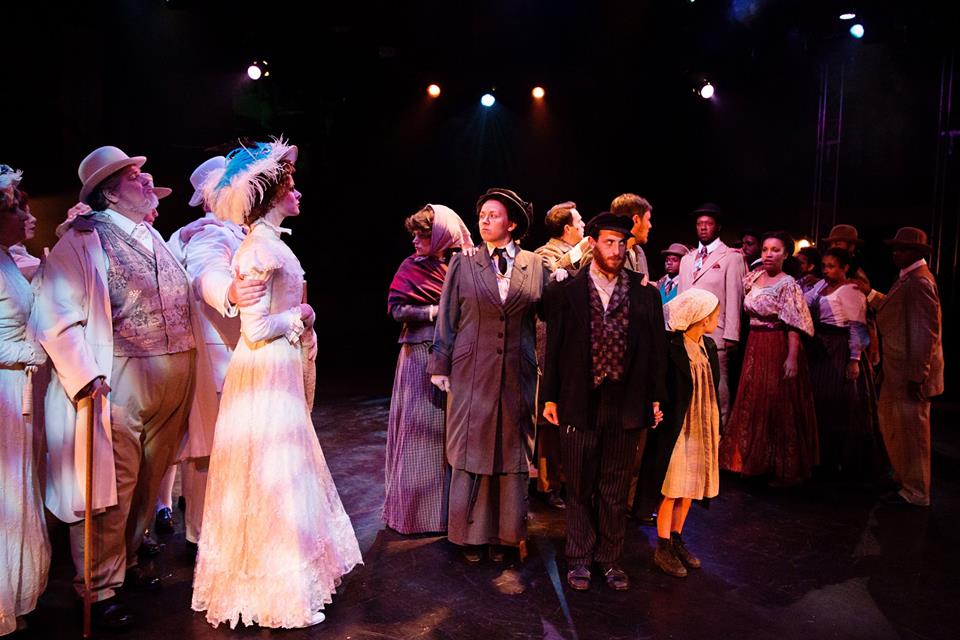Giving the nation a new syncopation, Toby’s the Dinner Theatre of Columbia proudly presents a masterful production of the treasured Ahrens and Flaherty musical Ragtime. Rolling on the wheels of a dream, the production is Directed by house Artistic Director Toby Orenstein and Co-Artistic Director Lawrence B. Munsey. With Musical Direction by Ross Scott Rawlings, this evocative, soul-searing musical brings forth a hunger for justice and presents to theatergoers all across the Columbia and greater Baltimore and Washington Metropolitan areas a sensationally talented cast with earnest heart and emotional depth. The message of America’s progress and how far the nation still has left to go has never been more poignantly articulated in Ahrens and Flaherty’s show.

Following the tracks of progress, resident Scenic Designer David A. Hopkins works with resident Lighting Designer Lynn Joslin to bring new vessels of technology into the intimate in-the-round space of Toby’s for its current production. Hopkins creates scrim-covered shadow boxes up against the walls all around the theatre, allowing Joslyn to project various moving sceneries upon them throughout the performance. Though at times some of the projections are muddled, they create some lovely background elements for the various scenic locations that shift throughout the piece.
The eye-popper with these boxes are the carved silhouette figures, dually representing both Tateh’s artwork and the shadowy outlines of the lives captured within the story of the tale. Joslyn backlights these silhouettes at key moments throughout the production to highlight their symbolic emphasis. In addition to her use of warm golden lights to frame tender and touching moments, such as several of Mother’s solos, and her overt use of blood-floods of red for more traumatic instances, Joslyn configures a moving projector that displays ocean rippling water and racing railroad tracks directly onto the floor for various scenes. This rise in technological innovation puts Toby’s on the move for the new age of theatre wherein everyone incorporates projections into the scenic and lighting design.

Replicating fashions of the turn of the century, resident Costume Designer Lawrence B. Munsey illustrates the social class differences among the three main focal groups of the show. Elegant creams with the subtlest hint of delicate pastels separate the upper class of New Rochelle from the muted earth tones with the slightest highlight of jewel tones from those in Harlem, a delineation still from the drab grays that appear in the immigrant class folks. Munsey works softer colors into the costume palettes of the woman, and does not skimp on the accessories when it comes to creating the initial opening image of these three very distinctive groups.
The music of Stephen Flaherty and Lyrics of Lynn Ahrens come to great justice under the keen Musical Direction of Ross Scott Rawlings. The heavy harmonies that make the music unique and original are skillfully blended under Rawlings guidance and result in some truly chilling emotional moments, particularly the group sound that emanates from the end of the first act. Rawlings ability to pair vocal compliments among Orenstein and Munsey’s excellent casting choices makes every duet a smooth and fulfilling number which connects strongly with the emotional sentiments of the show as a whole. The overall musical sound of the performance is powerful and reverberates with the echoes of change, the motivations of justice, and the intentions of dreams consistently throughout the production.
Directors Toby Orenstein and Lawrence B. Munsey have constructed an exceptional cast filled with intensely focused talent. The chemistry created between principle characters strongly carries the tragically beautiful story of their lives from the show’s opening through to the final note. Although the multitude of character introductions feels a bit rushed and unfocused in the beginning, Orenstein and Munsey tighten and sharpen this carousel moment by the production’s end so that as each character’s ending is readily accessible to the audience. Orenstein and Munsey craft a jarring and haunting moment together between Coalhouse and Sarah during “Sarah Brown Eyes.” A vivid dance of memory and emotion playing out between the two characters, the intentional way the characters never touch in this scene is a bittersweet moment of directorial perfection.
While the show’s primary vehicle is its music, the movement of the music follows closely on its heels under the Choreographic Design of Ilona Kesell. Despite creating sharper and cleaner routines for the men over the women during “The Gettin’ Ready Rag” and the initial clunky execution of the tri-turning carousel of characters in the opening number, Kesell seizes several opportunities to translate the language of dance into the music of Ragtime. Both “Atlantic City” and “Buffalo Nickel Photoplay Inc.” feature Kesell’s up-tempo period-appropriate hot steps and keep the scenes rolling along with the times. Kesell also engages the ensemble during “Crime of the Century” with her intriguing stool dancing among the Vaudeville stage set. On the whole the dancing is a solid addition to the production.
From the ensemble through to the listed principles, every person in the production fits their role and is well deserving of praise. The intense sounds created by the ensemble blast from the heart and soul and will not soon be forgotten. Whether it’s “Till We Reach that Day”, an ensemble number led by soloist Crystal Freeman’s powerful and soul-searing voice, or the deeply emotional moving sound of Booker T. Washington (at this performance DeCarlo Raspberry) during “Look What You’ve Done”, there are sounds of music so raw and emotionally loaded that they will stick in the memories of the audience for quite some time to come.
For every evocative and moving musical that comes with weighted emotional gravity there must be some levity, and while it carries in little spurts throughout the performance, it arrives most clearly in the form of the flighty and fancy-free Evelyn Nesbit (Julia Lancione.) Gliding with ease away on her swing during “Crime of the Century” Lancione’s delicate voice drifts with humor through this number, and entices her way into “Atlantic City” alongside the surly but mindfully present Houdini (Ben Lurye.) With a sturdy commanding accent to ground the famous magician in his immigrant roots, Lurye brings his seasoned operatic voice to the role with vigor, finding little moments throughout the production to make his sound pop with noticeable enthusiasm.
Other notable cameo performances include that of David Jennings and David James, taking on J.P. Morgan and Henry Ford respectively. Both ensemble men take on various other character roles, their work of which is distinctive enough to garner them notice throughout. James in particular, as one of Willie Conklin’s gang, finds a unique physicality for each of his ensemble moments that disguises him well among these varied characters. Watch both Jennings and James closely during “What a Game!” as they engage in some rather intense rough-housing the result of which perfectly captures the nature of what baseball has become. Jennings brings a loud vocal resonance to his sung moments as J.P. Morgan and James does the same with a sprightly and capitalistic vigor for the song, “Henry Ford,” which features the actor high atop a scaffolding and looking pleased with his production line assembly, another moment of Kesell’s intricately intriguing choreography.
Grandfather (Andrew Horn) has a crotchety attitude, but it suits his persona well. Horn delivers only a few moments of the character throughout the performance (blending as others deep into the ensemble throughout the show) but makes his portrayal memorable. He is often seen accompanying Edgar (at this performance Jace Franco) in and out of scenes. Franco is a precocious youngster that gives the character of the young lad quite a kick of energy, particularly when shouting at Houdini to “warn the duke!” His willfully amusing interactions with Little Girl (at this performance Camden Lippert) are lighthearted and innocent, a touching involvement that makes the story’s conclusion serene.
Younger Brother (Zac Brightbill) starts off in a flurry of confusion. Brightbill brings a wonderful fresh face to the Toby’s performance, and delivers an impressive emotional arch of his character from beginning to end. Fully articulating his character’s transformation, Brightbill embraces the foolish notions of infatuation he feels for Evelyn Nesbit and morphs them into driven passion once he encounters Emma Goldman (Coby Kay Callahan.) Brightbill’s vocal prowess is impressive as well, particularly during “He Wanted to Say” a trio shared with Emma and Coalhouse. The emotional energy that drives Younger Brother’s spoken moments are grounded deep within his extensive understanding of the character’s feelings.
Callahan, as the wildly impassioned Emma Goldman, is a screaming riot of bombastic energy. Her accent, above all, is rooted in the character’s immigrant background, and it carries into her singing voice with grace. Callahan delivers an enormous spark of revolution which explodes in a conflagration of unabashed raw spirit during “The Night that Goldman Spoke at Union Square.” Balancing this abrasive and caustic revolutionary exterior, Callahan finds a delicate and nurturing side when she addresses Tateh about his daughter. Her voice is an encouraging vocal harmony to that of Coalhouse and Brightbill’s younger brother during “He Wanted to Say.” A true force to be reckoned with when blasting about her character’s cause, Callahan is hands down the most noteworthy cameo character in the production.
Finding his place among the Toby’s veterans, much the way Tateh finds his place in America, is newcomer Josh Simon. With a gorgeous voice that carries his solos like “Success” and “Gliding”, Simon has proved his vocal worth resplendently. While he finds the humorous moments of shtick that make Tateh a step above the deplorable and desperate situation in which he has found himself, and though his Latvian accent is superb, Simon struggles in places to emotionally connect with the character. To his credit, he delivers several of his spoken moments in earnest, particularly when addressing Mother (Elizabeth Rayca.) “Journey On” a trio shared between Simon, Rayca, and Father (David Bosley-Reynolds) is one of the more vocally profound moments in the production, as these three voices harmonize perfectly together to create a bittersweet moment of emotions that crosses oceans to be heard.
Bosley-Reynolds as the convivial father brings an encouraging New Rochelle accent to his character portrayal and an earnest heart into his discussions and emotional conflicts with Mother. “Goodbye My Love”, a delicate duet shared with Rayca, allows both of their intentions to radiate through to one another, a sharp juxtaposition to what the pair delivers later in the show during a segment of “New Music.” The harrowing reality that resonates through Bosley-Reynold’s voice of he and Rayca’s character no longer seeing eye to eye is truly heartfelt. Bringing a robust sound to all of his songs, Bosley-Reynolds is a welcomed vocal addition to the cast throughout the show. His vivid facial expression do his character a great justice, particularly during “What a Game!” whilst engaging— or attempting to disengage— with the rabble-rousing hooligans in attendance of the baseball game. His expressive features also do his moments inside the Morgan Library scene a world of harrowing justice.
Elizabeth Rayca is stunning as Mother. With a dynamic emotional range that knows no bounds, her heartfelt outcries in each situation unearth a plethora of feelings, all of which are delivered with fortitude, courage, and the most exceptionally beautiful voice. Burning with compassion and humanity right from the beginning during “What Kind of Woman”, Rayca proves herself again and again throughout the piece with her earnest emotional connections, her expressive voice, and impeccable timing that delivers not only her internal struggles, but the deep layers that make up Mother. Her gentler side shown during “Nothing Like the City” and “Our Children,” both songs shared with Simon’s Tateh, allows Rayca to deliver sensibly reserved emotions in regards to Mother’s personal feelings. Her show-stopping moment comes during “Back to Before,” delivered with such a powerful sound, fiercely unleashed feelings, and an overall soulful connection that rings true through every note and word, Rayca commands the attention of the entire house in that moment and the result is spectacular. Truly remarkable in the role, Rayca is a shining star in a sea of radiant talent.
Falling under Mother’s maternal care is the young Sarah (Ada Satterfield.) Raw with vocal talent, Satterfield wails away her emotional turmoil during “Your Daddy’s Son.” Her voice is experienced at its best when in duet with the powerful Coalhouse Walker Jr (Kevin McAllister.) Their voices alight as one, turning their way with hopes and vivacious dreams through “Wheels of a Dream” and the chemistry that she conducts with McAllister is convincing, particularly during her initial refusal of him. “Sarah Brown Eyes” is another moment wherein Satterfield is able to express her delicate and talented voice opposite of McAllister and the result is a perfectly heartfelt duet between the pair.
With the sound of new music possessing his voice, Kevin McAllister as Coalhouse delivers a sensational performance. Soulful, heartfelt, and earth-shattering with his emotional connections to the character and to the music, McAllister is astonishing throughout the performance and sharply present in every moment wherein he’s on stage. It is not only his stunning voice, which itself is a masterpiece in action, but his ability to transcribe the character’s emotions through his entire body that makes his performance so astonishing. “New Music” delivers a soulful plea from McAllister that is smooth and heart-rending. Sharing this moment with Satterfield, chills are delivered in how truly raw the emotions of that musical moment are. The juxtaposition of this warmed, hopeful character that McAllister plays in the first half of the show, forced against the changes his character experiences in the second act is harrowing. The pivotal defining moment comes just before “Till We Reach That Day” and the emotional response, though mostly silent and physical, given by McAllister is so striking that the agony and anguish he experiences becomes palpable.

Launching into the second act with a brutal rendition of “Soliloquy” the furious flames of destructive vengeance possess his voice, his eyes, and his overall portrayal of the character, making him nearly unrecognizable from the man experienced in the first act. A stellar force upon the stage, McAllister delivers his own internal revolution of emotions that are bursting at the seams with soul, erupting with the need for vengeance and justice, and overflowing with heartfelt feelings. Leading the cast to surefire success, McAllister takes point with Coalhouse and drives the story home on the wheels of a most unshakeable dream.
A solid production well worth enjoying, an honest production well worth seeing, the story of Ragtime as told by the cast at Toby’s Dinner Theatre will settle into the minds, hearts, and souls of theatergoers this fall season and not easily be shaken. Truly bringing this corner of the nation a new syncopation, to the story, to the music, to the show, Ragtime at Toby’s is the must-see show of the fall 2015 season.
Running Time: 3 hours with one intermission
Ragtime plays through November 15, 2015 at Toby’s the Dinner Theatre of Columbia— 5900 Symphony Woods Road in Columbia, MD. For tickets please call (301) 596-6161 or purchase them online.

